新概念英语第一册第55课
- 格式:ppt
- 大小:3.43 MB
- 文档页数:16
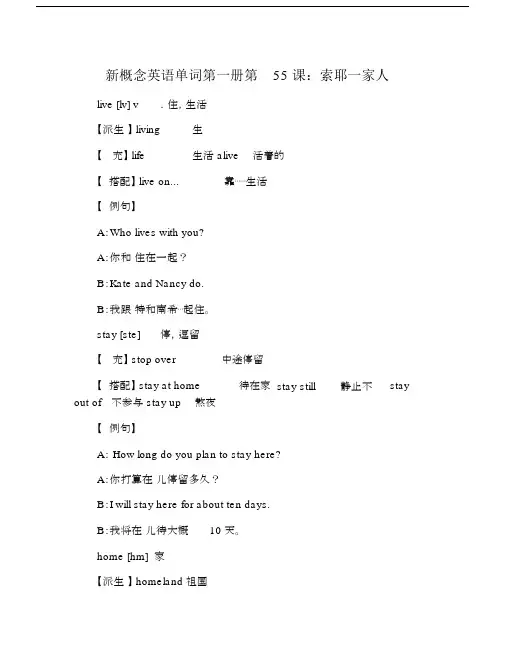
新概念英语单词第一册第55 课:索耶一家人live [lv] v.住,生活【派生】 living生【充】 life生活alive活着的【搭配】 live on...靠⋯⋯生活【例句】A:Who lives with you?A:你和住在一起?B:Kate and Nancy do.B:我跟特和南希⋯起住。
stay [ste]停,逗留【充】 stop over中途停留【搭配】 stay at home待在家stay still 静止不stay out of不参与stay up熬夜【例句】A: How long do you plan to stay here?A:你打算在儿停留多久?B:I will stay here for about ten days.B:我将在儿待大概10 天。
home [hm] 家【派生】 homeland 祖国【单词搭配】 at home 在家 go home 回家【单词例句】A:I must go back home where many things are waitingfor me to settleB: We're very sorry to see you go.A:我必须回国了,很多事正等着我去处理。
B:您要走了,我们感到非常遗憾。
housework['hauswa :k] 家务【单词构造】 house(房子) +work(工作) = housework (家务)【单词搭配】 do the housework做家务【单词例句】A: My mother always says I spend too much timeon watching TVA:我妈妈总是说我把太多的时间花费在看电视上。
B: Then you should finish your homework, and thenhelp your parents with the housework some day.B:那你以后应该先完成家庭怍业,然后帮父母做些家务。

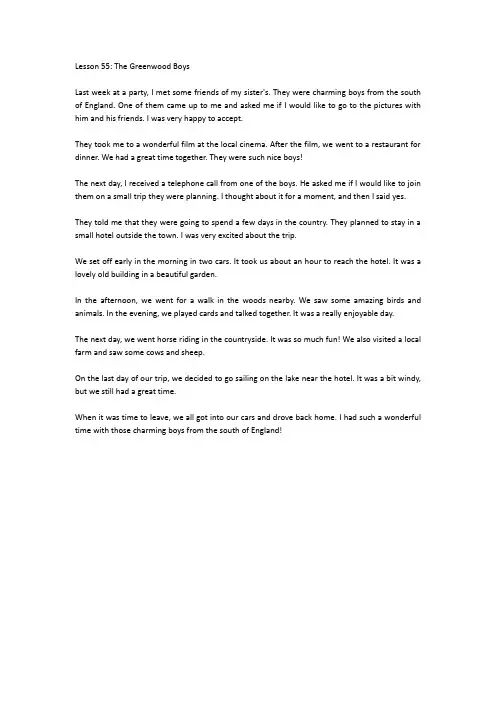
Lesson 55: The Greenwood BoysLast week at a party, I met some friends of my sister's. They were charming boys from the south of England. One of them came up to me and asked me if I would like to go to the pictures with him and his friends. I was very happy to accept.They took me to a wonderful film at the local cinema. After the film, we went to a restaurant for dinner. We had a great time together. They were such nice boys!The next day, I received a telephone call from one of the boys. He asked me if I would like to join them on a small trip they were planning. I thought about it for a moment, and then I said yes.They told me that they were going to spend a few days in the country. They planned to stay in a small hotel outside the town. I was very excited about the trip.We set off early in the morning in two cars. It took us about an hour to reach the hotel. It was a lovely old building in a beautiful garden.In the afternoon, we went for a walk in the woods nearby. We saw some amazing birds and animals. In the evening, we played cards and talked together. It was a really enjoyable day.The next day, we went horse riding in the countryside. It was so much fun! We also visited a local farm and saw some cows and sheep.On the last day of our trip, we decided to go sailing on the lake near the hotel. It was a bit windy, but we still had a great time.When it was time to leave, we all got into our cars and drove back home. I had such a wonderful time with those charming boys from the south of England!。
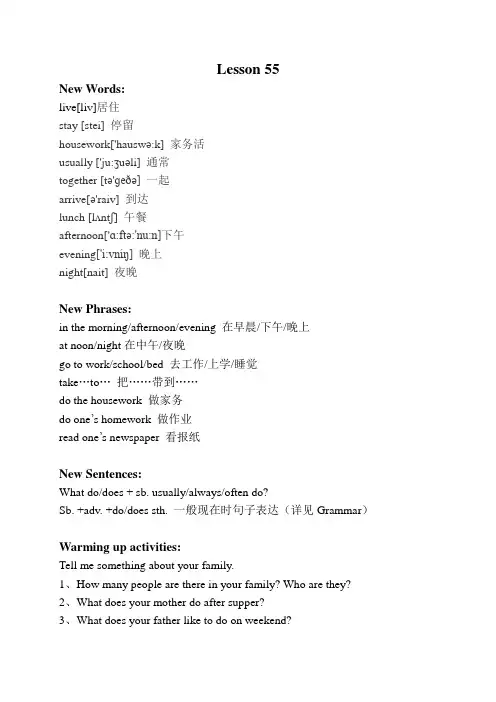
Lesson 55New Words:live[li v]居住stay[stei] 停留housework['hauswə:k] 家务活usually ['ju:ʒuəli] 通常together[tə'ɡeðə] 一起arrive[ə'raiv] 到达lunch[lʌntʃ] 午餐afternoon['ɑ:ftə:'nu:n]下午evening['i:vniŋ] 晚上night[nait] 夜晚New Phrases:in the morning/afternoon/evening 在早晨/下午/晚上at noon/night在中午/夜晚go to work/school/bed 去工作/上学/睡觉take…to…把……带到……do the housework 做家务do one’s homework 做作业read one’s newspaper 看报纸New Sentences:What do/does + sb. usually/always/often do?Sb. +adv. +do/does sth. 一般现在时句子表达(详见Grammar)Warming up activities:Tell me something about your family.1、How many people are there in your family? Who are they?2、What does your mother do after supper?3、What does your father like to do on weekend?After this, please open your book and turn to Lesson 55, let us see who are the Sawyers, and what do they like to do?Read the paragraph by yourselves and then watch the vedio.Now, please answer my question.What does Mrs. Sawyer usually do in the afternoon?When do the children always do their homework?Grammar:一般现在时:表示经常的习惯性的动作或者是现在的状态,常与表示频度的时间状语连用,表示客观事实或普遍真理。

新概念英语第一册单词第55课:索耶一家人live [lv] v.住,生活【派生词】living生计【单词扩充】life生活 alive活着的【单词搭配】live on...靠……生活【单词例句】A:Who lives with you?A:你和谁住在一起?B:Kate and Nancy do.B:我跟凯特和南希…起住。
stay [ste] 停,逗留【单词扩充】stop over中途停留【单词搭配】stay at home待在家 stay still静止不动 stay out of不参与 stay up熬夜【单词例句】A: How long do you plan to stay here?A:你打算在这儿停留多久?B:I will stay here for about ten days.B:我将在这儿待大概10天。
home [hm] 家【派生词】homeland祖国【单词搭配】at home在家 go home回家【单词例句】A:I must go back home where many things are waiting for me to settleB: We're very sorry to see you go.A:我必须回国了,很多事正等着我去处理。
B:您要走了,我们感到非常遗憾。
housework['hauswa:k]家务【单词构造】house(房子)+work(工作)= housework(家务)【单词搭配】do the housework做家务【单词例句】A: My mother always says I spend too much time on watching TVA:我妈妈总是说我把太多的时间花费在看电视上。
B: Then you should finish your homework, and then help your parents with the housework some day.B:那你以后应该先完成家庭怍业,然后帮父母做些家务。
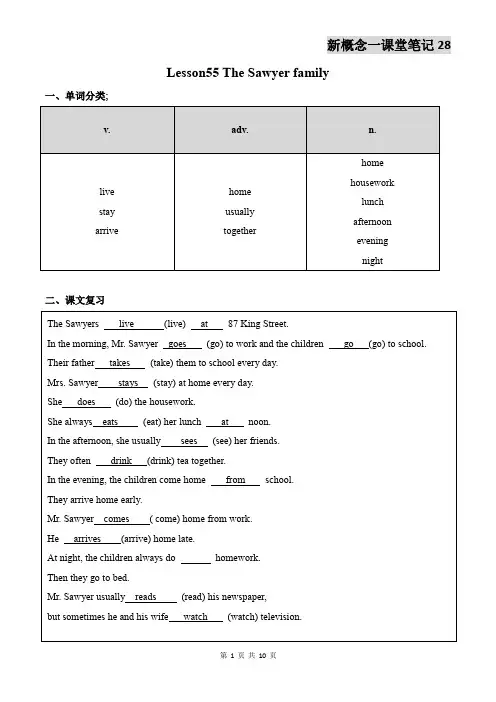
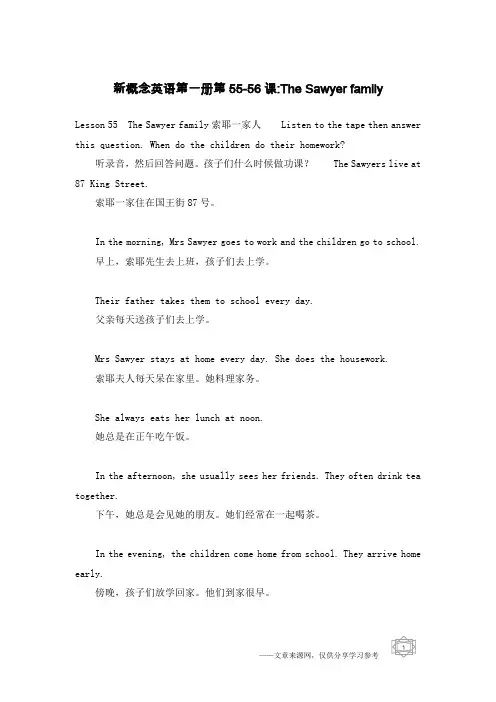
新概念英语第一册第55-56课:The Sawyer familyLesson 55 The Sawyer family索耶一家人Listen to the tape then answer this question. When do the children do their homework?听录音,然后回答问题。
孩子们什么时候做功课?The Sawyers live at 87 King Street.索耶一家住在国王街87号。
In the morning, Mrs Sawyer goes to work and the children go to school.早上,索耶先生去上班,孩子们去上学。
Their father takes them to school every day.父亲每天送孩子们去上学。
Mrs Sawyer stays at home every day. She does the housework.索耶夫人每天呆在家里。
她料理家务。
She always eats her lunch at noon.她总是在正午吃午饭。
In the afternoon, she usually sees her friends. They often drink tea together.下午,她总是会见她的朋友。
她们经常在一起喝茶。
In the evening, the children come home from school. They arrive home early.傍晚,孩子们放学回家。
他们到家很早。
Mr Sawyer comes home from work. He arrives home late.索耶先生下班回家。
他到家很晚。
At night, the children always do their homework. Then they go to bed.晚上,孩子们总是做作业,然后去睡觉。
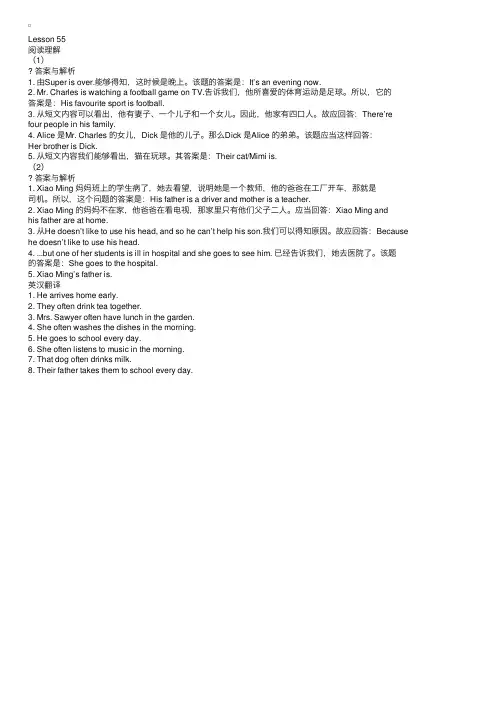
Lesson 55阅读理解(1)答案与解析1. 由Super is over.能够得知,这时候是晚上。
该题的答案是:It’s an evening now.2. Mr. Charles is watching a football game on TV.告诉我们,他所喜爱的体育运动是⾜球。
所以,它的答案是:His favourite sport is football.3. 从短⽂内容可以看出,他有妻⼦、⼀个⼉⼦和⼀个⼥⼉。
因此,他家有四⼝⼈。
故应回答:There’re four people in his family.4. Alice 是Mr. Charles 的⼥⼉,Dick 是他的⼉⼦。
那么Dick 是Alice 的弟弟。
该题应当这样回答:Her brother is Dick.5. 从短⽂内容我们能够看出,猫在玩球。
其答案是:Their cat/Mimi is.(2)答案与解析1. Xiao Ming 妈妈班上的学⽣病了,她去看望,说明她是⼀个教师,他的爸爸在⼯⼚开车,那就是司机。
所以,这个问题的答案是:His father is a driver and mother is a teacher.2. Xiao Ming 的妈妈不在家,他爸爸在看电视,那家⾥只有他们⽗⼦⼆⼈。
应当回答:Xiao Ming andhis father are at home.3. 从He doesn’t like to use his head, and so he can’t help his son.我们可以得知原因。
故应回答:Because he doesn’t like to use his head.4. ...but one of her students is ill in hospital and she goes to see him. 已经告诉我们,她去医院了。
该题的答案是:She goes to the hospital.5. Xiao Ming’s father is.英汉翻译1. He arrives home early.2. They often drink tea together.3. Mrs. Sawyer often have lunch in the garden.4. She often washes the dishes in the morning.5. He goes to school every day.6. She often listens to music in the morning.7. That dog often drinks milk.8. Their father takes them to school every day.。

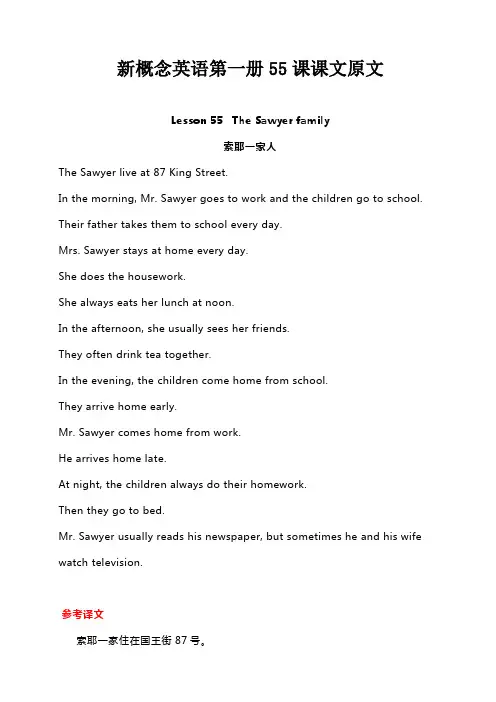
新概念英语第一册55课课文原文Lesson 55 The Sawyer family索耶一家人The Sawyer live at 87 King Street.In the morning, Mr. Sawyer goes to work and the children go to school. Their father takes them to school every day.Mrs. Sawyer stays at home every day.She does the housework.She always eats her lunch at noon.In the afternoon, she usually sees her friends.They often drink tea together.In the evening, the children come home from school.They arrive home early.Mr. Sawyer comes home from work.He arrives home late.At night, the children always do their homework.Then they go to bed.Mr. Sawyer usually reads his newspaper, but sometimes he and his wife watch television.参考译文索耶一家住在国王街87号。
早上,索耶先生去上班,孩子们去上学。
父亲每天送孩子们去上学。
索耶夫人每天呆在家里。
她料理家务。
她总是在正午吃午饭。
下午,她总是会见她的朋友。
她们经常在一起喝茶。
傍晚,孩子们放学回家。
他们到家很早。
索耶先生下班回家。
他到家很晚。
晚上,孩子们总是做作业,然后去睡觉。
索耶先生总是读报纸,但有时和他的妻子一起看电视。
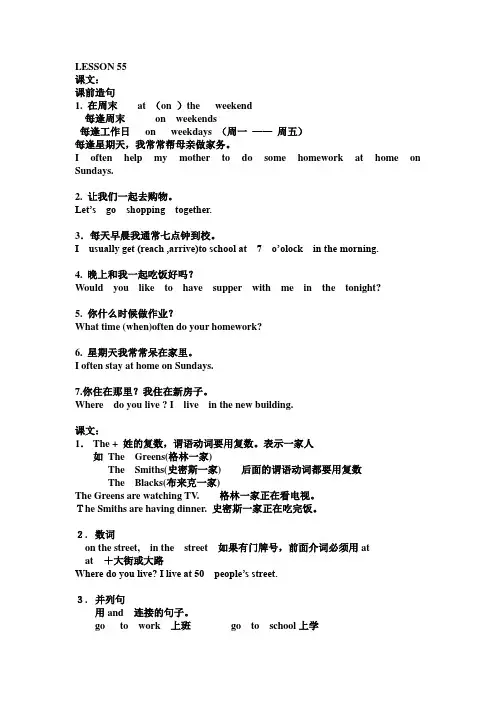
LESSON 55课文:课前造句1. 在周末at (on )the weekend每逢周末on weekends每逢工作日on weekdays (周一——周五)每逢星期天,我常常帮母亲做家务。
I often help my mother to do some homework at home on Sundays.2. 让我们一起去购物。
Let’s go shopping together.3.每天早晨我通常七点钟到校。
I usually get (reach ,arrive)to school at 7 o’olock in the morning.4. 晚上和我一起吃饭好吗?Would you like to have supper with me in the tonight?5. 你什么时候做作业?What time (when)often do your homework?6. 星期天我常常呆在家里。
I often stay at home on Sundays.7.你住在那里?我住在新房子。
Where do you live ? I live in the new building.课文:1.The + 姓的复数,谓语动词要用复数。
表示一家人如The Greens(格林一家)The Smiths(史密斯一家)后面的谓语动词都要用复数The Blacks(布来克一家)The Greens are watching TV.格林一家正在看电视。
The Smiths are having dinner. 史密斯一家正在吃完饭。
2.数词on the street, in the street 如果有门牌号,前面介词必须用atat+大街或大路Where do you live? I live at 50 people’s street.3.并列句用and连接的句子。
go to work上班go to school上学My parents go to work and I go to school. in the morning .每天早晨我父母去上班,我去上学。
新概念英语单词第一册第55课:索耶一家人live [lv] v.住,生活【派生词】living生计【单词扩充】life生活 alive活着的【单词搭配】live on...靠……生活【单词例句】A:Who lives with you?A:你和谁住在一起?B:Kate and Nancy do.B:我跟凯特和南希…起住。
stay [ste] 停,逗留【单词扩充】stop over中途停留【单词搭配】stay at home待在家 stay still静止不动 stay out of不参与 stay up熬夜【单词例句】A: How long do you plan to stay here?A:你打算在这儿停留多久?B:I will stay here for about ten days.B:我将在这儿待大概10天。
home [hm] 家【派生词】homeland祖国【单词搭配】at home在家 go home回家【单词例句】A:I must go back home where many things are waiting for me to settleB: We're very sorry to see you go.A:我必须回国了,很多事正等着我去处理。
B:您要走了,我们感到非常遗憾。
housework['hauswa:k]家务【单词构造】house(房子)+work(工作)= housework(家务)【单词搭配】do the housework做家务【单词例句】A: My mother always says I spend too much time on watching TVA:我妈妈总是说我把太多的时间花费在看电视上。
B: Then you should finish your homework, and then help your parents with the housework some day.B:那你以后应该先完成家庭怍业,然后帮父母做些家务。
The Sawyers live at 87 King Street.In the morning, Mr. Sawyer goes to work and the children go to school. Their father takes them to school every day.Mrs. Sawyer stays at home every day. She does the housework.She always eats her lunch at noon.In the afternoon, she usually sees her friends. They often drink tea together.In the evening, the children come home from school. They arrive home early.Mr. Sawyer comes home from work. He arrives home late.At night, the children always do their homework. Then they go to bed. Mr. Sawyer usually reads his newspaper, but sometimes he and his wife watch television.New Word and expressions 生词与短语livev. 住,生活stayv. 呆在,停留homen. 家;adv. 到家houseworkn. 家务lunchn. 午饭afternoonn. 下午usuallyadv. 通常togetheradv. 一起eveningn. 晚上arrivev. 到达nightn. 夜间本文参考译文索耶一家住在国王街87号。
早上,索耶先生去上班,孩子们去上学。
v1.0可编辑可修改Lesson 55-56 The sawyer family一、单词与短语live : v.住,生活;stay:v.呆在,停留;两个单词都表示呆在某地,但是live强调长时间呆在某地,stay强调暂时呆在某地。
例:I am staying at my aunt ′ s in Tianjinright now, but actually I live in Shanghai.我整呆在天津的姑姑家里,但其实我住在上海。
home: n. 家; adv. 在家,到家。
Housework: n. 家务;housework 是个合成词,是由 house (家)和 work (工作)结合而成,英语中这样的单词还有很多,如home(家)+work(工作)→ homework(家庭作业)补充:do housework:做家务 do homework:做家庭作业;afternoon:n.下午;evening:n.晚上;night:n.夜间;英语中表示一天的早中晚一般用介词in如:在早上:in themorning; 在晚上 :in the evening; 但是有两个例外: at noon:在正午; at night:在深夜。
lunch: n.午饭;此外早饭:breakfast;晚饭:supper;一日三餐名词前冠词必须要省略,而且吃饭的吃可以用eat也可以用have。
如:吃早饭: eat breakfast也可以说havebreakfast。
usually:adv.通常,usually是典型的一般现在时的标志。
together: adv.一起;arrive:v.到达;此外reach 也11v1.0可编辑可修改有到达的意思,reach是及物动词,后面不用介词。
Reach school :到学校。
二、短语句型与语法★★★ 1、需要引起注意的一个重点句子:The Sawyers live at 87 King Street.索耶一家住在国王街87 号。